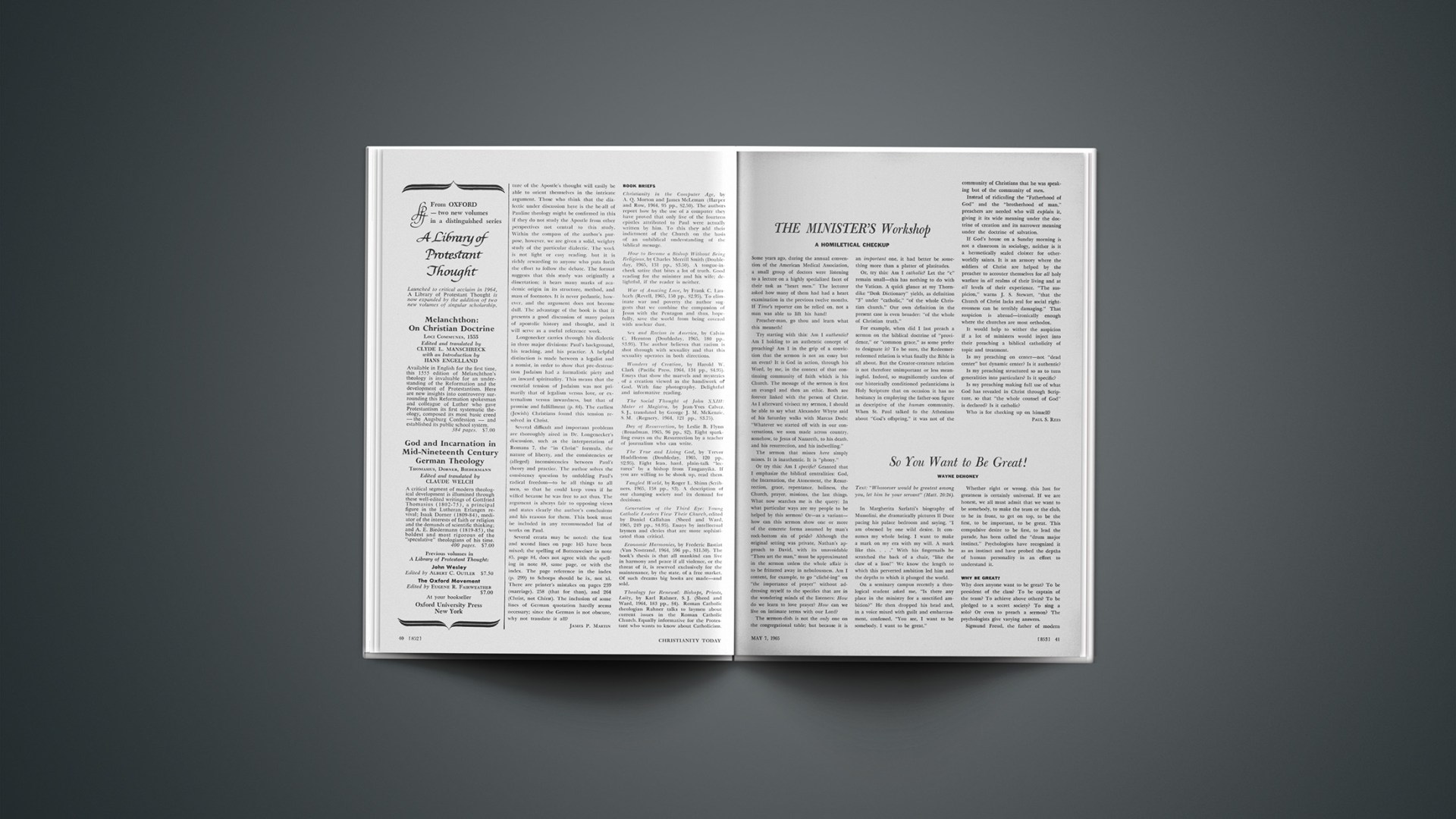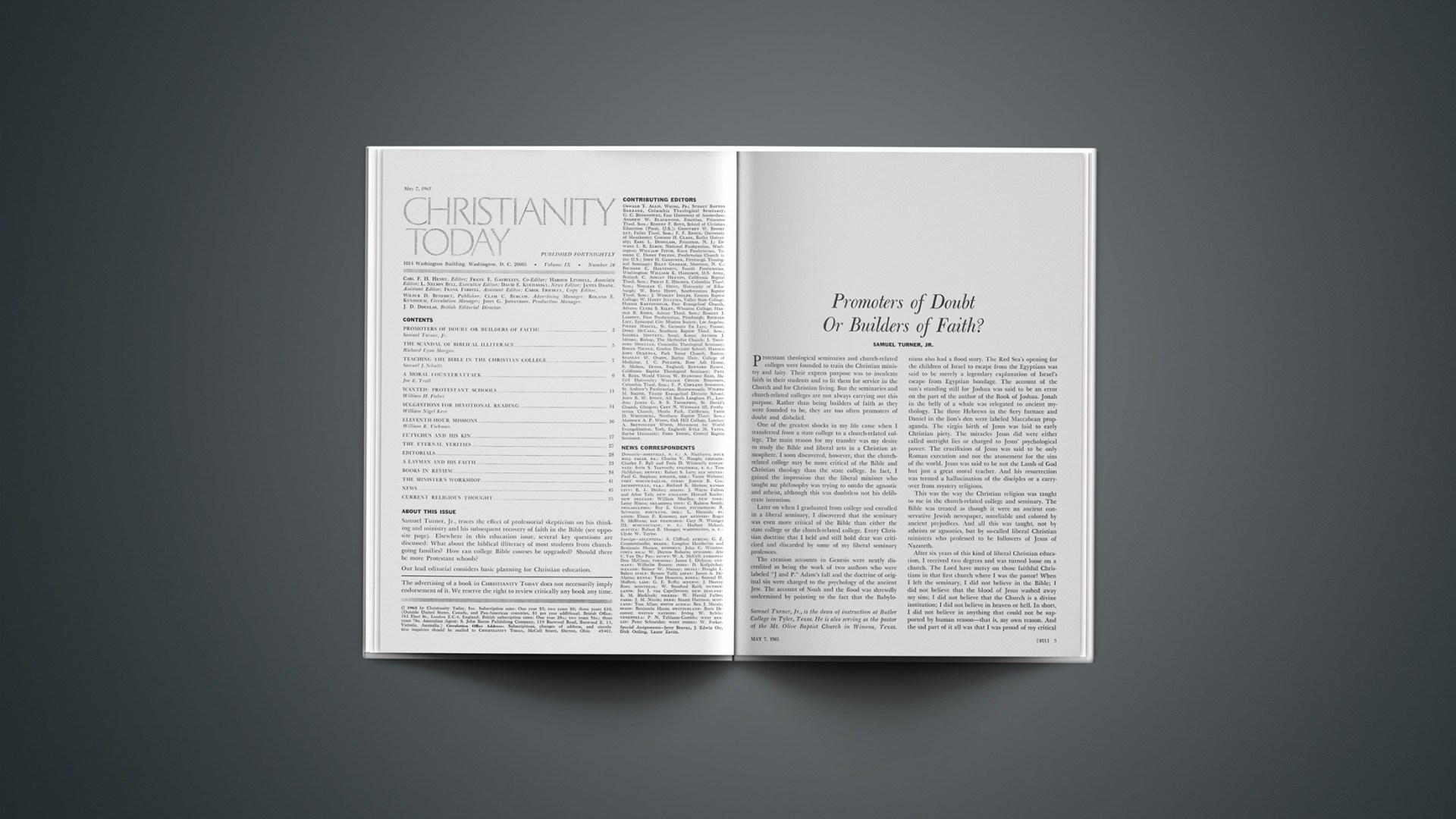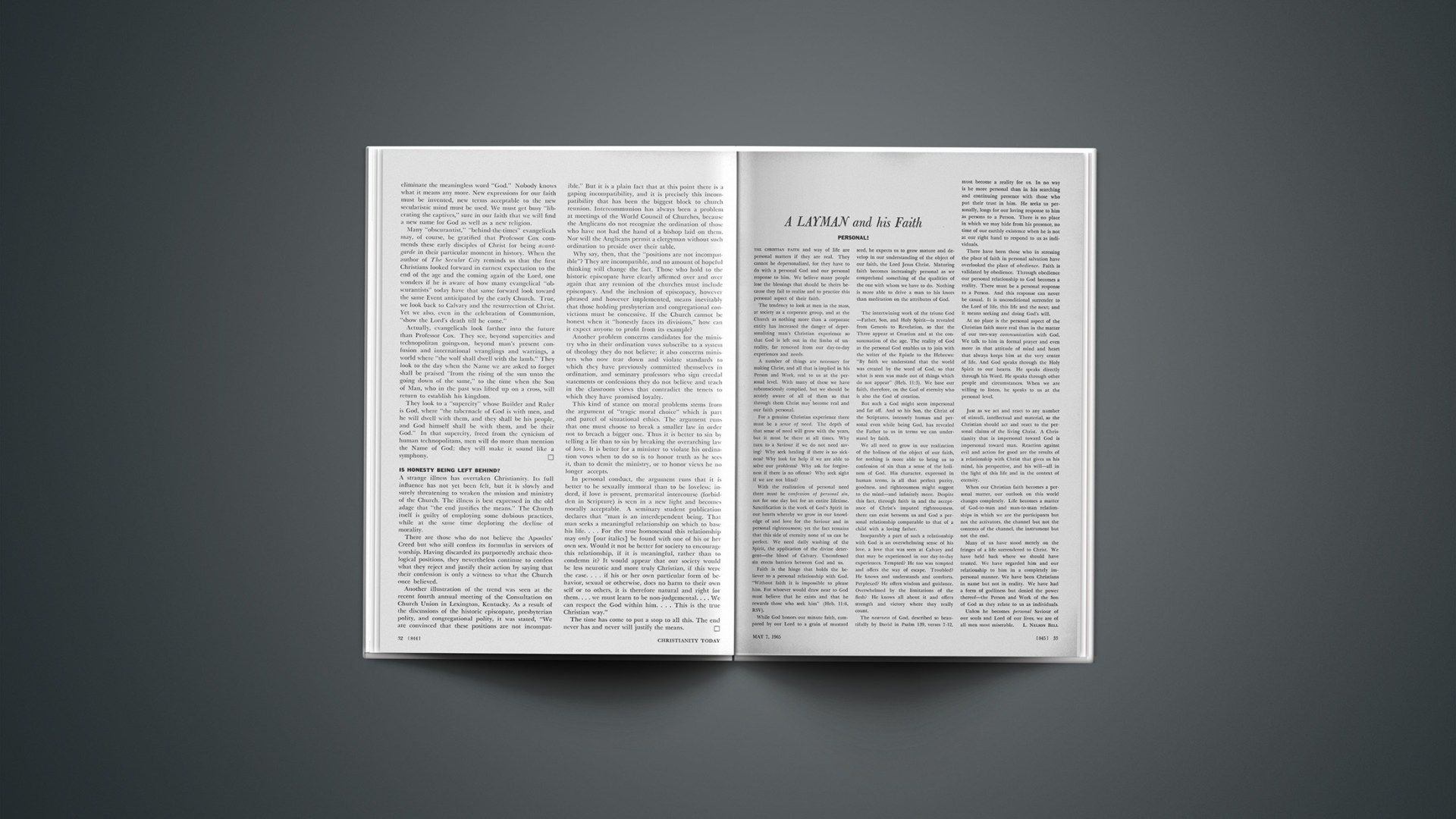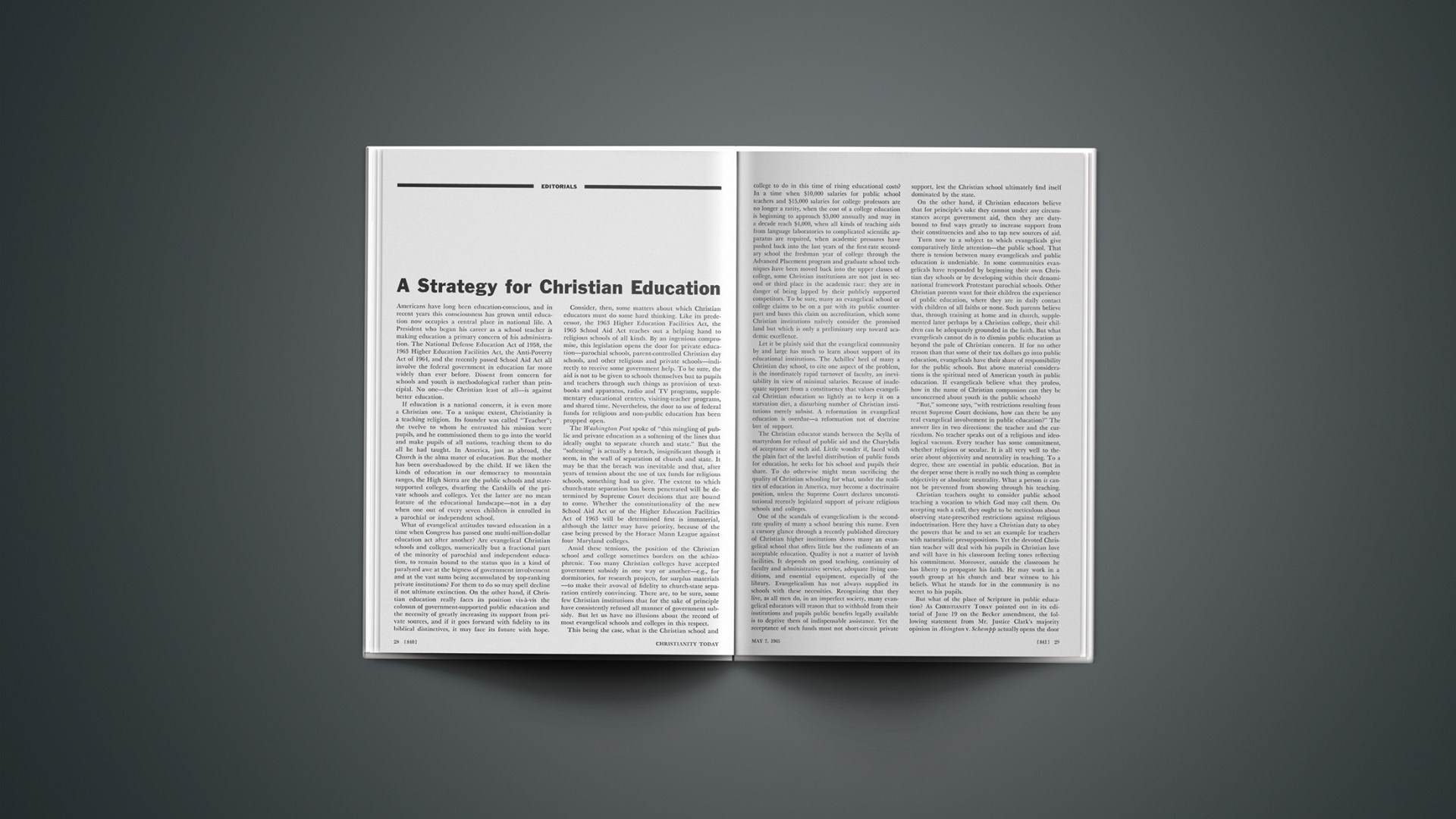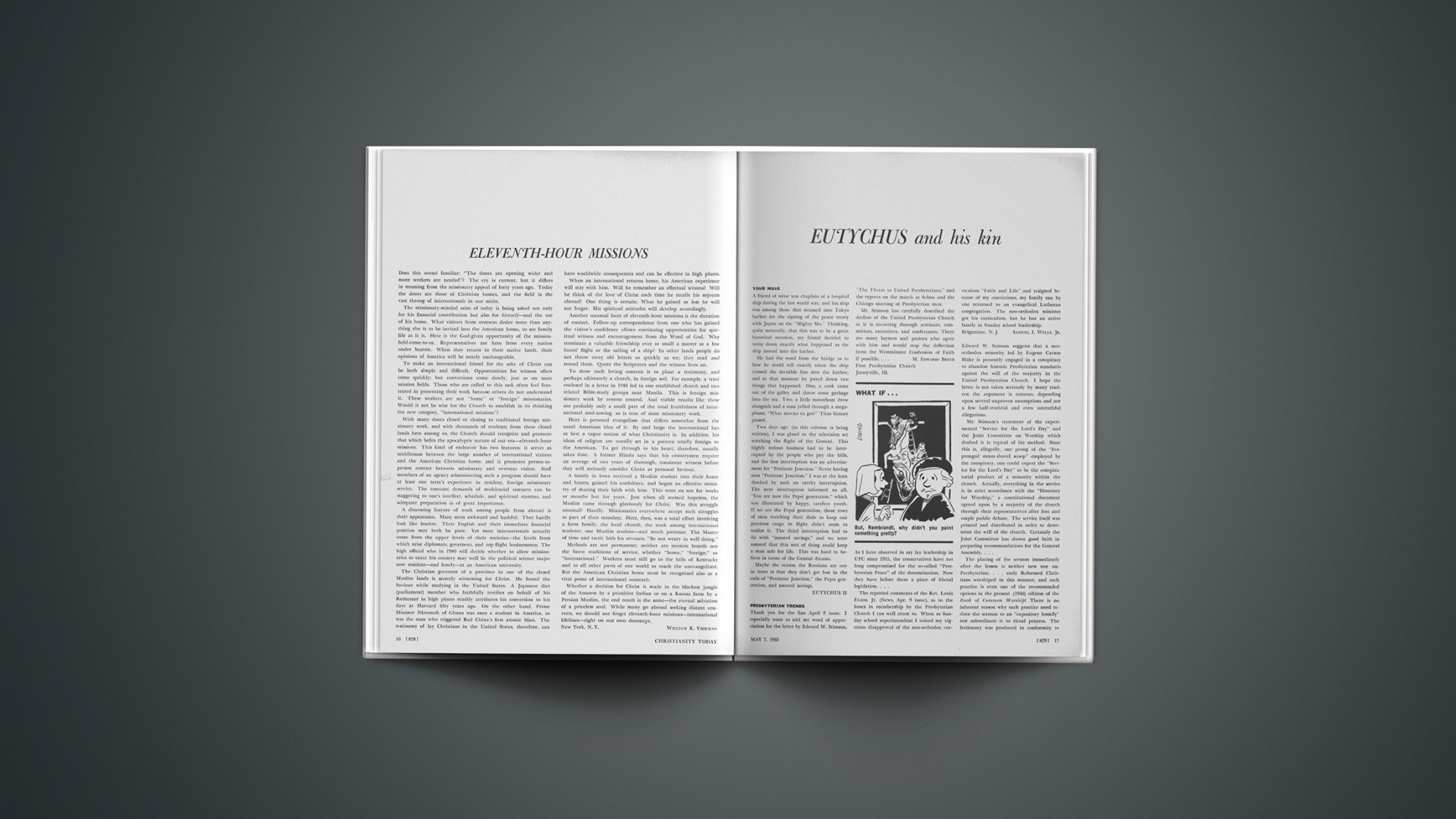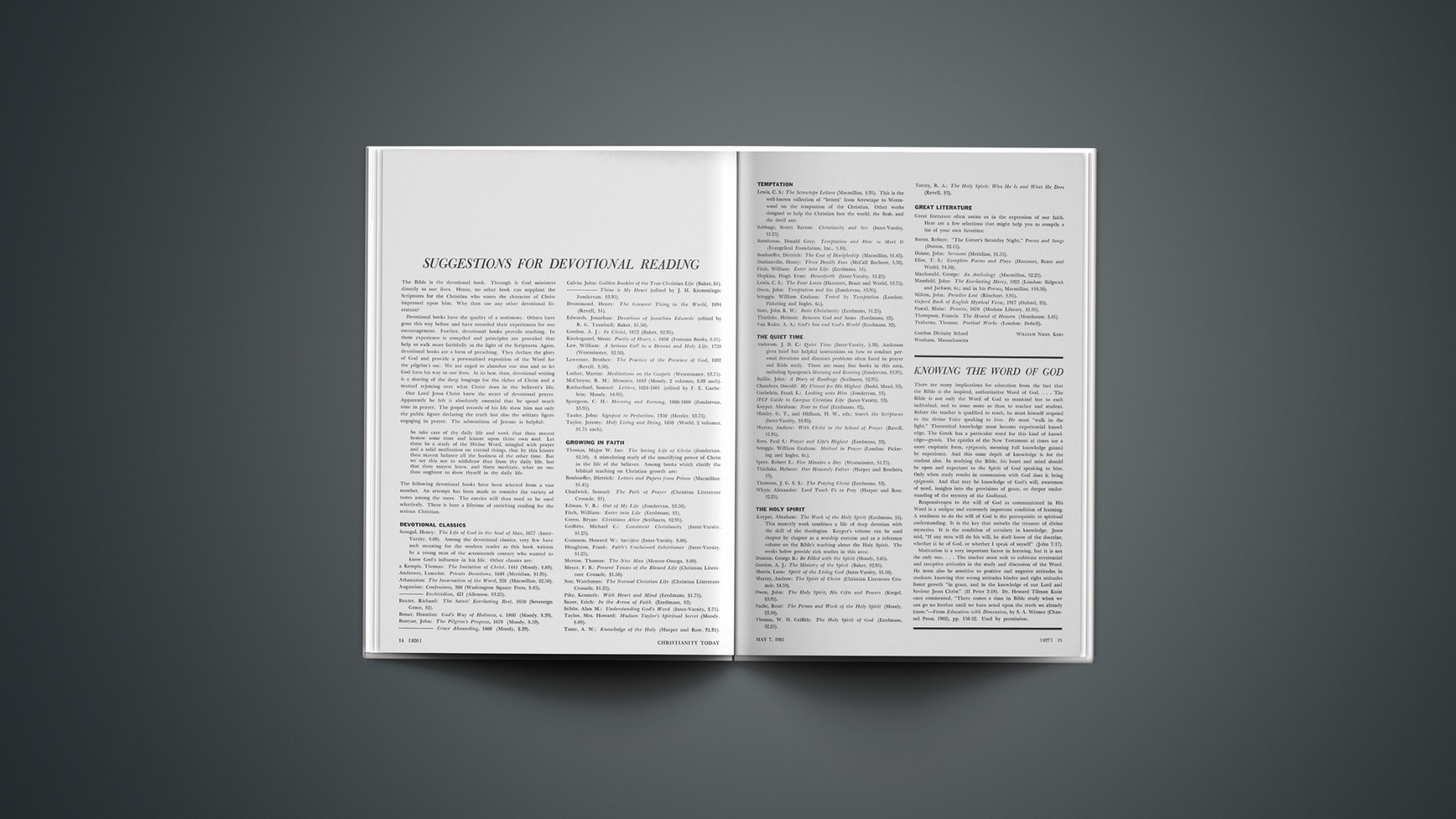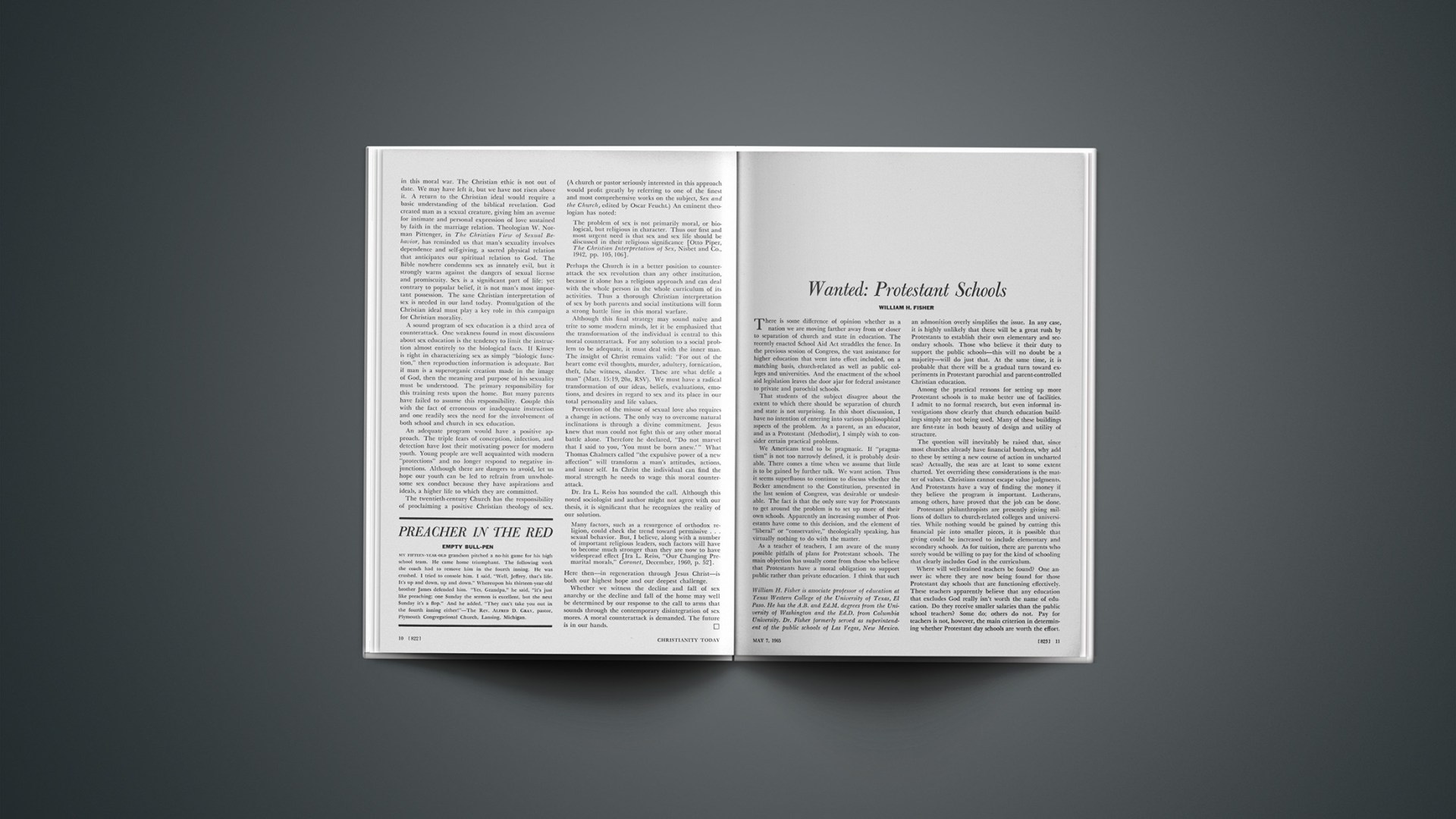Text: “Whosoever would be greatest among you, let him be your servant” (Matt. 20:26).
In Margherita Sarfatti’s biography of Mussolini, she dramatically pictures Il Duce pacing his palace bedroom and saying, “I am obsessed by one wild desire. It consumes my whole being. I want to make a mark on my era with my will. A mark like this.…” With his fingernails he scratched the back of a chair, “like the claw of a lion!” We know the length to which this perverted ambition led him and the depths to which it plunged the world.
On a seminary campus recently a theological student asked me, “Is there any place in the ministry for a sanctified ambition?” He then dropped his head and, in a voice mixed with guilt and embarrassment, confessed, “You see, I want to be somebody. I want to be great.”
Whether right or wrong, this lust for greatness is certainly universal. If we are honest, we all must admit that we want to be somebody, to make the team or the club, to be in front, to get on top, to be the first, to be important, to be great. This compulsive desire to be first, to lead the parade, has been called the “drum major instinct.” Psychologists have recognized it as an instinct and have probed the depths of human personality in an effort to understand it.
Why Be Great?
Why does anyone want to be great? To be president of the class? To be captain of the team? To achieve above others? To be pledged to a secret society? To sing a solo? Or even to preach a sermon? The psychologists give varying answers.
Sigmund Freud, the father of modern psychology, says, “This is simply the expression of the ego.” Self-expression is one of the primary drives in human personality. Religionists have regarded this insatiable drive of the ego with suspicion. Someone has said, “The ego and the egg, both must be broken before they can be used.”
Freud’s pupil, the Swiss psychologist Carl Jung, disagreed with his teacher. He said it is the “hunger for power.” In the human personality there are two basic tendencies, one aggressive, the other recessive. Regardless of how passive and recessive a personality may be, there is still this aggressive instinct, the hunger for power and authority. Everybody wants to boss somebody. A man had his wife along while shopping for a suit. As he tried on the suits the clerk brought out, his wife found something wrong with each one. The color, the fabric, the cut—something was wrong. After the weary clerk had brought out every suit in the store, he pulled the man aside and said, “Excuse me, sir, but are you buying this suit for yourself?” The man answered, “Only the coat and the vest.” Jung says this is the “hunger for power” instinctive in every personality.
Then Alfred Adler, the father of modern psychiatry, said that this instinct is really something else—a “desire for recognition.” It is this that causes us to wear buttons and uniforms and insignia and to attach significance to where we sit at the table, or where we march in the parade. We want to be recognized!
And then John Dewey applied psychology to education. He saw in this instinct something else. He said it is a “drive for significance.” We all want to feel important, important to ourselves and important to others. We want to be a wheel. And if we cannot be a wheel, we will attach ourselves to someone who is a wheel in order to feel important. We want either to have a coattail or to ride someone else’s coattail in order to seem important. To illustrate this sense of personal significance, Lady Astor, while speaking at a banquet, said, “It is most amazing how the most learned, educated, brilliant men attach so little significance to their personal appearance. Even tonight at this very dinner, the most entertaining, cultivated, and charming guest here is wearing a carelessly knotted loose tie.” As though at a given signal, every man present slipped his hand up to check the knot of his necktie.
This is a natural instinct, the universal desire to be somebody. No one wants to be a nobody. An ex-convict sat in my study with tears streaming down his face saying, “I have been a number so long. Tell me how I can now be somebody.”
Jesus had to come to grips with this human desire in the story of our text. As his party was traveling toward Jerusalem, there were rumors that he would declare himself king. The crowds were pressing him to assert his power. The disciples expected him to claim the seat of David and wrest the authority of the government from the Romans. Then it was that Salome and her sons, James and John, came to the Master. She said, “Lord, my husband Zebedee and I have supported you from the beginning. We have given money and goods to your cause. We have given two sons who have been faithful and devoted followers from the beginning. Now that you are coming in to your kingdom, may I ask this one favor? When you are on the throne, let my sons, James and John, sit beside you, one on the left and one on the right. Let one be the secretary of state and the other secretary of the treasury in the kingdom.” And when the other disciples heard this request, they were angry. Not only were they angry with Salome and the self-seeking ambition of their two brethren: they were also angry with themselves for not having thought to ask for these positions first.
The Response Of Jesus
Jesus did not condemn this desire for greatness as ungodly or unworthy. The desire to be important in itself is not a sin. Jesus knew that this is an instinct planted in the human personality by God himself. As such it is not evil. No instinct in itself is wrong. The end to which we use the God-given instinct determines whether it is moral or immoral. This is true of the instinct of sex. Sex in itself is not evil; it is planted in the human personality as one of God’s good gifts to mankind. Inside the marriage relationship it is one of God’s great blessings. Outside marriage it is a destructive and damning sin. And so it is with this instinct for greatness: it is a good gift of God when channeled toward the right goals.
As Jesus did not condemn this ambition to be great, neither did he approve the false piety and humility that scorns and criticizes ambition. He would agree with the one who said:
I hate the guys
That criticize
And minimize
The other guys
Whose enterprise
Has made them rise
Above the guys
That criticize
And minimize.
Jesus did not commend the Milquetoast personality that scorns ambition and achievement with a pious “excuse me for living” attitude. A Methodist bishop examining a group of candidates for the ministry asked them if they had a “strong desire for pre-eminence” in their calling and work. To the last man, in humble and pious words, they confessed they were free from any such ambitious desires. The bishop then exclaimed, “Then you are a sorry lot indeed—not one of you worthy of ordination!” He went on to explain that no other person in all the world fired the ambitions of people like Jesus Christ. Christ helps little people to be big, nameless nobodies to be somebodies, by achieving real greatness.
Thus Jesus fires the ambitions of all of us when he says to the mother of James and John and to the disciples, “So you want to be great—wonderful! You ought to be great. How disappointed I would be if you were satisfied with littleness, insignificance, and mediocrity. But as you seek to be great, be sure that you seek the true greatness.” Whosoever among you would be great—let him seek it. But do not mistake the greatness of this world for true greatness.
Worldly Standards Of Greatness
Although Jesus did not condemn their desire to be great, he did condemn their worldly standards and measurements of greatness. The world measures greatness by false standards.
The world says you are great according to the power that you exercise over others. The more authority you have to dominate others, the greater you are.
In reading The Rise and Fall of the Third Reich, I was impressed as never before with the realization that perhaps the major responsibility for World War II must be laid at the doorstep of a German philosopher, Friedrich Nietzsche, who measured greatness in these terms. Nietzsche, ironically the son of a Prussian pastor, said Christianity is “the greatest of all conceivable corruptions, the one immortal blemish on mankind.” He said further, “Slavery is one of the essential conditions of a high culture.… The misery of the men who struggle painfully through life must be increased to allow a small number of Olympian geniuses to produce the great works of art.” To him there were only two classes of people, the supermen and the masses of dumb brutes who served them. Communism differs from this Nazi philosophy only in that the Communists veneer the exploitation of the masses with the promise of future democratic ideals.
Does not this same philosophy permeate the social, political, and business structures of the very communities in which we live? One of the most fascinating aspects of sociology is the study of the power structure of a community. One of the textbooks on this subject, A Sociological Study of the Power Structure of the City of Atlanta, reveals how twenty-five men at the top of the pyramid run the city and actually control the lives of more than a million people. The manipulation of politics, business and finance, government, institutions, and even churches is a cold and calculated science on the part of the “great men” who are at the top. A careful scientific study will reveal that every community has its power structure with a half dozen to a score of “big people” using everything and everybody in the community for selfish ends.
And what then is the measure of greatness, the ambition of the worldly? In this mad scramble in the huddle, it is to climb to the top of the power structure. The world says this is the measure of greatness—the amount of authority that you have over others.
The world also says that you are great by the position you hold. Recognition makes you great. During the administration of President Taft, a family friend of long standing asked the President to appoint her husband, who was a house-painter, to the position of secretary of commerce. She harassed the President daily, seeking this appointment. Finally the President, in an effort to explain the impossibility of her request, said, “For secretary of commerce we need a man of vast experience in this field. To fill this position we must have a big man.” This did not discourage the woman in the least. She replied, “Appoint my husband secretary of commerce and then he will be a big man!” This is the philosophy of the world. Position determines greatness.
Thus it was that the mother of James and John felt that if Jesus would put her sons in a big position, they would be big men in the kingdom.
The world says also that possessions make you great. Have you read the book The Status Seekers? It describes this false standard of greatness. It shows how ridiculous we are in measuring status by “things.” Your greatness is measured by the street on which you live, the size of your house, the kind of car you drive. You climb up the ladder of status as you drive cars in the following order: The lowest on the ladder are those who drive “used big cars”; the next level is a new light car; then a foreign car; then a foreign sports model; and finally the top status cars, the Cadillacs or the custom-made foreign cars. Big people wear alligator shoes, silk shirts, mink stoles. Thus we use this absurd standard of “possessions” and “things” to measure greatness.
Jesus’ Standard For Greatness
Jesus answered Salome, Greatness is not mine to give. Greatness must be earned. Neither can greatness be measured by the worldly standards of position or possessions or power. You want to be great? You were made for greatness! Pray to be great. Seek to be great. But he that would be greatest among you, let him be your servant.
In this single sentence Jesus turns the parade of the world around. In the parade of humanity, the world has put at the head of the column the kings, the military commanders, the rich, those who have positions of honor and recognition. Behind them come the great masses of humanity, followed by the servants at the very end of the procession. Jesus turns this procession around and says “The greatest of these are the servants.”
A man in his mid-fifties was dying of cancer. To his pastor, who was at the bedside, he said, “Pastor, ten years ago the church asked me to teach a class of nine-year-old boys in Sunday school. I told them I was too busy. And I was, with all the heavy demands on my time and energy. I was in the prime of my life and rapidly rising in business affairs. And now, ten years later, here I am, dying, with the greatest regret of my life being that I did not accept that responsibility. I am saved, and I know that when I die I shall go to be with the Lord. But if ten years ago I had taken time to teach that class of ten boys, by now perhaps 100 boys would have passed through my hands. I would have invested my life in the lives of 100 boys, and many of them would be scattered throughout the world, growing in service and usefulness as Christian young men. I would have made an investment in time and in eternity through them. But now I must go empty-handed before the Master. I can’t take any of my money or my business or my stocks or bonds with me. What a fool I have been.” He was simply saying what Jesus said, “He that would be greatest among you, let him be the servant.” The greatest joy, the greatest self-realization that your soul can experience is in being a servant to others in the name of Jesus Christ and his cause.
Atop Red Mountain, overlooking the city of Birmingham, is the huge iron figure of Vulcan, the Roman god of fire. He stands as the symbol of the industrial wealth of the great city of Birmingham. For here is a solid mountain of red iron ore, and in the valley below are coal and dolomite deposits that feed the blast furnaces. Vulcan is the symbol of the booming steel industry, the banks, the places of commerce, the houses, and the other “things” that sustain a million people in this industrial center of the South. At the foot of the mountain is a circular parkway. In its center is a life-sized statue of a little man on his knees in prayer, his head bowed, and one hand lifted upward toward God. It is the statue of Brother Bryan. Just around the corner is the church of which he was the pastor for almost half a century, the Third Presbyterian Church, still called “Brother Bryan’s church.” Who was this little man? He was an humble servant of the Lord Jesus Christ. When he died, the city mourned: the flags flew at halfmast and businesses dosed. The city officials declared a holiday to observe his funeral. For he had gone about the streets of Birmingham day in and day out, stretching forth a hand in kindness. His congregation could not keep an overcoat on his back, for always he found someone on the street who needed it worse than he did. His pockets were always empty, regardless of how much money was thrust upon him, for he always found someone who was hungry, cold, in need of medicine. He was often seen kneeling on the sidewalks with one hand upraised toward God in prayer, in the exact position of the statue, with the other hand on another person—someone weeping in sorrow, perhaps, or drunk, or kneeling in repentance seeking the Lord. Without power, position, or possessions, Brother Bryan was one of Birmingham’s greatest citizens.
And when the winds and the storms of time have long since reduced the iron statue of Vulcan to dust and leveled Red Mountain to the ground and buried the last remnant of the city of Birmingham in the sands of time, the fruits of the life of Brother Bryan will still be standing. That which he did in the name of Jesus Christ in service to his fellow man will stand for all eternity. As Jesus said, He that would be the greatest among you, let him be your servant.—This sermon was preached at the First Baptist Church of Jackson, Tennessee, on February 14, 1965.

